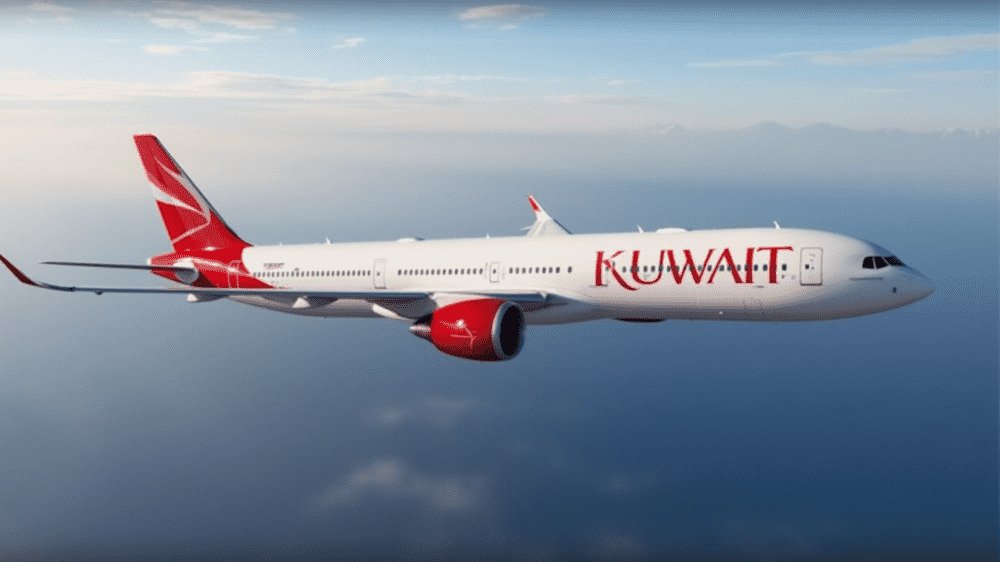Travel Guides & Articles
Kuwait and India Supercharge Air Connectivity with Historic Agreement Catapulting Weekly Seat Capacity by 50% to Fuel Surge in Passenger Traffic

Tuesday, July 22, 2025
breaking agreement is signed between Kuwait and India on air connectivity. This new agreement will see the weekly seat capacity between the 2 countries rise by an impressive 50%, providing exciting new possibilities for travel and trade. As more and more people seek comfortable and convenient air travel from the Gulf to India and the sub-continent, this agreement will help to take the economic and human links between the two regions to new and unheralded levels. With this addition of capacity, Kuwait and India are not only further catering to a growing number of travellers, but also facilitating new cooperation and deepening partnership in this key aviation market.
Kuwait and India have made a significant move to strengthen their air transport links with the signing of a new air services agreement. This agreement will see a major expansion of seat capacity between the two nations, increasing the weekly seat allocation by 50 percent, from 12,000 to 18,000 seats in each direction. The agreement, which marks the first increase in bilateral air rights for Kuwait since 2006, reflects the growing demand for air travel between the two countries and is designed to meet the evolving needs of travelers on both sides.
The memorandum of understanding reflects a mutual desire to improve air connectivity and enhance cooperation in civil aviation, ensuring that the growing demand for flights between Kuwait and India is met effectively. The deal demonstrates the countries’ commitment to developing their aviation industries and building stronger air transport ties to support their strategic goals.
One of the main objectives of the agreement is to address the increasing demand for flights, driven by the growing economic and social connections between Kuwait and India. With bilateral trade, tourism, and business interactions expanding, both nations are experiencing higher levels of air traffic. Airlines such as Kuwait Airways, Jazeera Airways, Air India Express, IndiGo, and Akasa Air are already operating close to 40 flights per day on this busy route, and this increase in seat capacity will accommodate the growing number of passengers traveling between the two countries.
The agreement aligns with the broader trends in Gulf aviation, which has seen rapid growth over the years. The expansion of air rights was a long-standing request from Kuwait, and this agreement represents a breakthrough in fulfilling that need. By increasing the available seat capacity, the two countries aim to make air travel more accessible to their citizens, allowing for greater flexibility and convenience when traveling between Kuwait and India.
Indian carriers have responded quickly to the new opportunities offered by the expanded air rights. IndiGo, India’s largest low-cost carrier, has requested an additional 5,000 seats to meet the increased demand. Similarly, Air India Express and Akasa Air have both applied for 3,000 additional seats each, while Air India is looking to secure an extra 1,500 seats. With these applications, Indian airlines are preparing to increase their services and ensure they can meet the travel needs of passengers.
The new capacity provisions are expected to come into effect by August 2025, with a particular focus on high-demand routes from cities like Chennai, Kochi, Bengaluru, and Thiruvananthapuram. To ensure a smooth transition, Indian aviation authorities have called for proposals from airlines by July 21 to facilitate slot allotments and regulatory approvals, ensuring the timely commencement of services under the expanded capacity.
The expanded aviation pact will also have broader commercial implications. The increase in seat capacity will create new opportunities for both Kuwait and India, driving greater trade and tourism between the two nations. By enhancing air connectivity, both countries aim to support people-to-people exchanges, strengthen bilateral business relations, and promote tourism, all of which are vital to their long-term economic growth. As more direct flights become available, more travelers will have the opportunity to visit, do business, and explore new opportunities in each country, creating a positive impact on the wider economies.
This agreement comes at a crucial time when international air travel is experiencing a post-pandemic boom. As global air traffic rebounds, regions like the Gulf and South Asia are seeing significant growth in demand. The Kuwait-India aviation agreement addresses this surge by providing the necessary capacity and flexibility for airlines to scale their operations and offer more choices to passengers. Furthermore, it aligns with the ongoing efforts of both nations to position themselves as key players in the global aviation network.
The deal is also expected to strengthen the people-to-people connections between the two countries. As India and Kuwait continue to foster close ties, both culturally and economically, the aviation sector plays a critical role in maintaining and expanding these relationships. This partnership will allow Kuwaiti and Indian citizens to travel more freely between the two nations, promoting mutual understanding and enhancing collaboration in a range of fields.
Ultimately, the Kuwait-India air services agreement is a reflection of the evolving dynamics of global aviation. As travel demand increases and connectivity becomes even more important, such agreements will help ensure that both nations remain competitive in a rapidly changing global market. With enhanced air links, Kuwait and India will continue to deepen their ties and provide greater opportunities for collaboration, trade, and travel. This expanded aviation agreement is a strategic step towards achieving those goals and supporting the growing demand for air travel between the two nations.
Travel Guides & Articles
Calling all thirsty Joburg agents!

Travel agents and ITCs – you are invited to the last Travel News Thirsty event of the year!
No speeches, no presentations. Just networking.
Come join us in Sandton on Wednesday, October 23, from 17h00 to 19h00.
If you are a travel agent, please email rsvp@travelnews.co.za with ‘Thirsty’ in the subject line. Attendance is by invitation only, so it’s essential to RSVP and receive confirmation.
We look forward to seeing you there!
Travel Guides & Articles
KMP Expressway- travel from Manesar to Palwal to get smoother, 53 km stretch to be repaired soon News24 –

Repair work on the Manesar to Palwal section of the Kundli-Manesar-Palwal (KMP) Expressway will begin next week. The Haryana State Industrial Infrastructure Development Corporation (HSIIDC) has completed preparations for the project. A total of Rs 48 crore will be spent on repairing this 53 km stretch.
The budget has been approved by the High Power Purchase Committee of the Haryana government. Accidents often occur due to potholes across the roads, illegal cuts and broken railings. Along with the road repairs, all illegal cuts will be closed and the railings will be repaired, Jagran reported.
Although the entire KMP Expressway is in poor condition, the stretch between Manesar and Palwal is in the worst state. The road has sunk at many place and the tar layers have peeled off. There are more than 20 illegal cuts on this section of the expressway. The situation is especially concerning in Nuh district, where vehicles enter the expressway from unauthorised points due to these illegal cuts. As a result, drivers are falling victim to accidents on a daily basis.
Moreover, vehicles cannot maintain the prescribed speed of 120 kilometers per hour anywhere on the expressway due to its poor condition. Large potholes are present along the main carriageway creating problems for commuters especially during night. Furthermore, potholes near the Gurugram border, also add to the risk and inconvenience for commuters on daily basis.
About KMP Expressway
The six-lane Kundli-Manesar-Palwal (KMP) Expressway in Haryana spans a total length of 135.65 kilometers. It is an access-controlled, six-lane high-speed toll road, featuring elevated sections at road junctions, underpasses for cattle, cars, and tractors, barricading to prevent animal entry, and constant surveillance.
The expressway facilitates smooth transportation of surplus food grains, milk products, fruits, and vegetables from Haryana, Punjab, Himachal Pradesh, and Kashmir to other parts of the country. Additionally, it provides faster access to the International Airport for vehicles coming from northern parts of the county.
Travel Guides & Articles
Indian women trafficked to Malaysia on visa-free entry for domestic work

CHANDIGARH: It is not only Gulf countries where women from India, who had gone there on the pretext of a job offer, got trapped; Malaysia has now become the new destination.
Women, especially from Tamil Nadu, Telangana, Andhra Pradesh, Punjab, Kerala and Uttar Pradesh, are being taken to this Southeast Asian nation with promises of legitimate domestic work. Travel agents use the visa-free entry route to lure them, after which they are forced to live and work in conditions described as unstable and precarious.
In an advisory issued on September 9 this year, the High Commission of India, Kuala Lumpur (Labour Wing), in a document titled “Indian nationals getting stranded in Malaysia”, a copy of which is with this newspaper, stated: “The majority of the affected individuals are unskilled/semi-skilled labourers and hail from several states in India including Tamil Nadu, Telangana, Andhra Pradesh, Punjab, Kerala and Uttar Pradesh. They are invariably misled with false promises of employment by unscrupulous agents in India and Malaysia.”
“The following issues of concern came to the notice of the High Commission: Indian nationals travelling under the pretext of tourism but intending to look for employment are often denied entry on arrival. Those who manage to enter the country often overstay beyond 30 days and are thus declared ‘illegal’. Entry is also refused to those Indian nationals who are genuine tourists but fail to provide valid documentation, including return tickets, proof of accommodation, and financial means,” it stated.
It further read: “It has been observed that unscrupulous agents in India and Malaysia entice a number of Indian nationals with prospects of employment and arrange their travel to Malaysia on the pretext of tourism to get visa-free entry and stay for 30 days in Malaysia. Such individuals become illegal after expiry of 30 days and are thus vulnerable to various forms of exploitation locally. They are also subjected to detention, imprisonment and associated legal actions by Malaysian enforcement agencies.”
The High Commission of India, Kuala Lumpur has further advised all State Governments, Protectors of Emigrants (PoE) and immigration officers to issue public advisories and exercise strict scrutiny of Indian nationals, especially ECR passport holders, departing to Malaysia from international airports including Trichy, Chennai, Hyderabad, Kolkata, Cochin, Bengaluru and Amritsar.
It has also been stated that passengers deceived by agents should be encouraged to provide full details of such agents, and that information may be compiled and shared with state and central government authorities for appropriate action.
-

 Business2 weeks ago
Business2 weeks agoThe Guardian view on Trump and the Fed: independence is no substitute for accountability | Editorial
-
Tools & Platforms1 month ago
Building Trust in Military AI Starts with Opening the Black Box – War on the Rocks
-

 Ethics & Policy2 months ago
Ethics & Policy2 months agoSDAIA Supports Saudi Arabia’s Leadership in Shaping Global AI Ethics, Policy, and Research – وكالة الأنباء السعودية
-

 Events & Conferences4 months ago
Events & Conferences4 months agoJourney to 1000 models: Scaling Instagram’s recommendation system
-

 Jobs & Careers3 months ago
Jobs & Careers3 months agoMumbai-based Perplexity Alternative Has 60k+ Users Without Funding
-

 Podcasts & Talks2 months ago
Podcasts & Talks2 months agoHappy 4th of July! 🎆 Made with Veo 3 in Gemini
-

 Education3 months ago
Education3 months agoVEX Robotics launches AI-powered classroom robotics system
-

 Education2 months ago
Education2 months agoMacron says UK and France have duty to tackle illegal migration ‘with humanity, solidarity and firmness’ – UK politics live | Politics
-

 Podcasts & Talks2 months ago
Podcasts & Talks2 months agoOpenAI 🤝 @teamganassi
-

 Funding & Business3 months ago
Funding & Business3 months agoKayak and Expedia race to build AI travel agents that turn social posts into itineraries





















